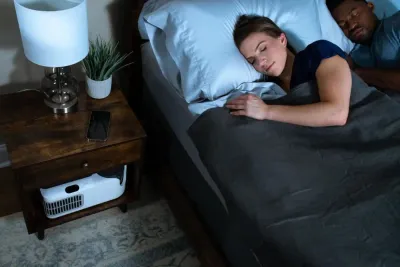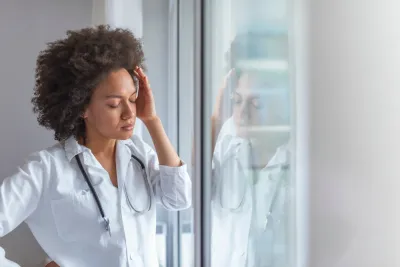What is Sleep Hygiene and Why is It Important?
Ana Marie Schick: Resident Sleep Expert and Certified Health Coach • Sep 28, 2022

Key Takeaways
Sleep hygiene is a set of evidence-based habits and environmental factors designed to prime your body for high-quality, uninterrupted sleep.
- Sleep hygiene includes consistent bedtimes, a cool and comfortable bedroom, and screen-free wind-down time that help train your body for sleep.
- Simple routines like reading, light stretching, or resetting your sleep space can calm the mind and improve overall sleep quality.
- Modern habits—blue light exposure, late caffeine, and nighttime scrolling—can disrupt your circadian rhythm if left unchecked.
- Good sleep hygiene is personal. Using sleep data, adjusting your environment, and building routines that fit your lifestyle lead to more restorative rest.
There is an old Irish proverb that says:
“A good laugh and a long sleep are the best cures in the doctor’s book.” [1]
It turns out that your grandmother and great-grandmother were right. Decades of research have confirmed their wise advice: the duration, as well as the quality of sleep, are foundational to human health, productivity, and happiness.
The path to good sleep, especially now, can be long and winding. After all, we're constantly bombarded by the pressures of work, family, and global events. We're also so busy that we sadly put our sleep needs on the back burner.
Unfortunately, many of us have been conditioned over the years to minimize the value of healthy sleep habits. We know now from definitive and well-executed research over time that sleep is not an optional activity. [2]
So, what helps us along that path to ha good nigh-quality's sleep that rejuvenates our mind, body, and spirit?
The answer lies in optimal sleep hygiene.
What is Sleep Hygiene?
Think of sleep hygiene as your bedtime routine's best friend. It's all about creating healthy habits that make it easier to fall asleep and stay asleep.
This includes things like:
- Making your bedroom a sleep sanctuary: Think cozy, dark, and quiet. [3]
- Unwinding before bed: A warm bath, reading, or light stretching can do wonders.
- Sticking to a consistent sleep schedule: Go to bed and wake up around the same time each day, even on weekends.
All of these steps work together to give you optimal sleep hygiene. [4]
The ideal sleep hygiene strategy is different for everyone. Many factors come into play, including the following:
- Do you travel?
- Does your job require shift work?
- Do you have a medical condition or take medication that interferes with sleep?
Also, we're all unique, with different backgrounds, cultures, and genetic histories. Thus, it takes time to explore and establish your own sleep hygiene design.
Sleep hygiene refers to the practices and habits that help promote better sleep, duration, and consistency. Good sleep hygiene is essential for overall health and well-being, as it can improve cognitive function, mood, and physical health.
On the flip side, poor sleep hygiene can lead to common sleep disorders, daytime fatigue, and other health problems. By understanding the importance of sleep hygiene, individuals can take steps to establish healthy sleep habits and reduce the potential risk of developing sleep problems.
Whether it’s creating a calming bedtime routine or optimizing your sleep environment, these practices can make a significant difference in achieving healthy sleep.
Elevate Your Sleep Hygiene with the Chilipad
With the Chilipad, you can experience superior sleep through personalized temperature control, helping you cool down quickly and enhancing your sleep hygiene.
Ways to Improve Your Sleep Hygiene
Discover simple, everyday habits that can dramatically enhance your sleep quality, from creating a relaxing bedtime routine to optimizing your sleep environment
Establishing a Sleep Schedule
Establishing a solid sleep schedule is crucial for good sleep hygiene. This involves going to bed and waking up at the same time every day, including weekends. A consistent sleep schedule helps regulate the body’s internal clock, making it easier to fall asleep and stay asleep.
It’s also important to establish a relaxing bedtime routine to signal to the body that it’s time to sleep. This can include activities such as reading, meditation, or deep breathing exercises.
Maintaining a regular sleep schedule can significantly improve your sleep quality, ensuring you get enough rest each night.
Sleep Rituals: Why They Matter
Social scientists and psychologists dedicate tremendous clinical inquiry into the benefits of ritual behaviors. Often, the term “ritual” invokes big events, such as weddings and graduations.
There are numerous smaller but no less important habits that calm or give us confidence. Think of when you high-five your child before a big test. We also listen to our favorite soft music or wear a lucky shirt before important meetings.
As humans, we naturally take comfort in engaging in preparatory activities because it reduces anxiety and uncertainty. Performing rituals with the intention of certain results increases chances of success. [5]
Inadequate sleep hygiene is a significant contributor to various sleep-related issues, including insomnia and daytime sleepiness.
Our sleep hygiene or “sleep rituals” needn’t be particularly complex, flashy, or expensive. Study findings indicate regularity of daytime activities could improve sleep. Bedtime routines can be as simple as gazing at favorite photos or playing music that reminds us of a cherished vacation.
Even the act of tidying your sleep space or fluffing up pillows can signal to mind and body that it’s time to settle down for the night.
Healthy Habit Formation
The benefits of sleep rituals are closely tied with the concept of habit formation. Thought leaders at the Health Behaviour Research Centre at University College, London, strongly emphasize the value of habit formation for numerous health behaviors.
The development of healthy habits begins simply with goals that can be easily reached. These little changes add up to big achievements in sleep hygiene, reducing the risk of bad sleep quality.
Dr. Roy Baumeister, a psychologist at Florida State University, has done multiple studies on human decision-making and willpower. His research reveals that we are excellent at changing our behavior to achieve long-term goals and benefits. This is done by avoiding tempting situations and replacing unhealthy behaviors with healthy ones. [6]
Related Blog: How to Feng Shui Your Bedroom
Room Temperature
This includes keeping the temperature on the cool side, banning TVs from the bedroom, and making sure the bed is comfortable.
Limit the Use of Electronics
Free yourself from electronic devices 30-60 minutes prior to bedtime, limiting blue light. Sleep deprivation is a widespread issue affecting about 33% of adults in the United States, with serious implications for overall physical and mental health. This decreases mental stimulation and minimizes blue light, which can keep us awake. [7]
Want to know how blue light messes with your melatonin and why scrolling in bed might be sabotaging your sleep? Learn more about limiting tech before bedtime and protecting your sleep cycle.
Avoiding Stimulants and Distractions
Limiting the amount of stimulants and distractions before bedtime plays an important role when it comes to good sleep hygiene. These stimulants can interfere with sleep quality and make it difficult to fall asleep. Additionally, creating a sleep-conducive environment by keeping the bedroom cool, dark, and quiet can also promote better sleep.
If you are able to limit these distractions, you can improve your chances of falling asleep faster and enjoying a good night’s sleep.
Meditation Exercises
Many meditations and breathing routines can effectively clear your mind and slow your metabolism. [8] [9]
White Noise Machine
“White noise,” or sound-masking equipment, such as from a fan, has been shown to induce sleep. [10]
Finding What Works for You
The beauty of an individualized sleep hygiene strategy is that you create something that works best for you. Thus, if you travel, your sleep recipe and special toolbox can travel with you. Sure, you won’t be able to sleep in your own cozy bed while staying at a hotel.
But still, you can certainly pack your comfy slippers and lower the room temperature. Every little bit helps when trying to maintain your bedtime ritual! [11]
For persistent sleep issues, consulting with sleep medicine specialists can be crucial. They can provide expert help and proper diagnosis, which can significantly enhance treatment outcomes for conditions like obstructive sleep apnea and insomnia.
Whether at home or on the road, many people can relate to the stress that’s created during the holidays or family gatherings. Even though we love our families, the tensions created can be similar to those of many high-stress professions. Why should you practice good sleep hygiene? By creating good sleep hygiene, it can help people cope with these stressors.
Admittedly, it can be difficult to find that “sweet spot” of the perfect sleep hygiene strategy. When it comes to caffeine intake (which includes other substances in addition to coffee), empirical research has reported a variety of findings.
The discrepancy might be due to the concept of half-life. Half-life can be described as the amount of time it takes for the body to metabolize approximately half of the drug it has consumed. In the case of caffeine, half-life is used as an approximation of when effectiveness begins to decrease. [12] [13]
How long caffeine stays in the body depends on the individual, their tolerance level, genetic makeup, total daily caffeine intake, and individual body metabolism. For some people, caffeine has no effect at all, meaning no sleep problems. [14] [15]
Did You Know: Nicotine, much like caffeine, acts as a stimulant that revs up your system, making it harder to wind down and fall asleep. That’s why smoking is often linked to a variety of sleep problems, from trouble falling asleep to waking up throughout the night.
But, it may affect you. If it does, learn more about how caffeine can affect your sleep.
The below checklist can help you find new ways to strengthen your sleep and bedtime rituals. Applying minor changes or adjustments can improve the quality of your sleep, resulting in more energy and improved mood. Give one or two a try, but be patient; keep in mind that it will take a few days (or weeks) to see changes.
Sleep Hygiene Checklist
Here's a checklist to help you optimize your sleep:
- Create a Regular Routine for Bedtime
- Start Winding Down 1-Hour Before Bedtime
- Limit Access to TV, Smartphone & Computer
- The Bedroom Should Be Cool and Dark
- Exercise Daily. Try to Avoid Strenuous Exercise 2 Hrs Before Bed.
- Alcohol Consumption. Avoid Drinking Alcohol Before Bedtime
- Create a Relaxing Routine
- Write Down Last-Minute Thoughts
- Create a Sleep Diary
- Evaluate Your Bedroom Temperature
Signs You Might Have Poor Sleep Hygiene Practices
Think of poor sleep hygiene like a messy room – it makes it hard to relax and get comfortable. Just like a messy room, weak sleep habits can make it tough to fall asleep and stay asleep.
Here are some common signs:
- Frequent Sleep Disturbances: Do you often wake up in the middle of the night and have trouble falling back asleep? Or do you toss and turn a lot throughout the night? These are signs that your sleep might be disrupted.
- Daytime Sleepiness: Feeling tired and sluggish during the day, even after a full night's sleep? This could be a sign that your sleep isn't as restful as it should be.
- Difficulty Falling Asleep: Do you find yourself lying in bed for hours, unable to drift off? This is a common symptom of poor sleep hygiene.
- Lack of Sleep Quality and Quantity: This means you're not getting enough sleep, and the sleep you do get isn't deep and restorative. You might wake up feeling unrefreshed, even after a full night.
Sleep Tip: Consider using a sleep tracker like Sleepme to gain a deeper understanding of your sleep
Final Thoughts
There are many benefits of good sleep hygiene, including preventing and developing sleep disorders and other related concerns. Sleep hygiene is essential for everyone, from early childhood to adulthood.
Scientific research continues to untangle the magic and mystery of this critical part of human self-care and development. One of the conclusions is that various sleep hygiene strategies work differently depending on genetics, personality, body metabolism, and a host of other factors. If you are still having trouble falling asleep, it's recommended you speak with your doctor.
At sleepme, we encourage the exploration of your ultimate sleep hygiene design.
As Dr. William Dement, founder of the Sleep Research Center at Stanford University, once said, “You’re not healthy unless your sleep is healthy.” [16] In addition to his groundbreaking research, we wouldn’t be surprised if he also listened to his grandmother.
Frequently Asked Questions About Sleep Hygiene
What Are 5 Tips for Sleep Hygiene?
- Set a Sleep Schedule and Stick to It: Like syncing devices, your body thrives on consistency. Go to bed and wake up at the same time every day—even on weekends.
- Power Down Your Screens: Blue light from phones and laptops tricks your brain into staying alert. Shut ‘em down at least an hour before bed to let melatonin do its thing.
- Create a Sleep-Optimized Environment: Cool (around 65°F), dark, and quiet is the gold standard. Think blackout curtains, white noise machines, and ditch the bedside disco lights.
- Cut the Caffeine by 2 P.M.: Coffee and energy drinks linger in your system longer than you'd expect. Set a caffeine curfew to avoid late-night jitters.
- Reserve Your Bed for Sleep Only: No emails, no binge-watching, no scrolling. Treat your bed like sacred sleep real estate, and your brain will get the hint.
Why Does Sleep Hygiene Matter?
Good sleep hygiene boosts everything: cognition, memory, mood, immunity, cardiovascular health—you name it. Poor habits, on the other hand, link to insomnia, daytime sleepiness, depression, and even heart disease
Can I Just Ignore Sleep Hygiene?
Not really. Research shows that while hygiene alone doesn’t cut it for chronic insomnia, it’s a vital part of comprehensive therapies like CBT?I. Skipping it might delay better solutions
Peer-Reviewed Research References
-
Dement, W. C. (Ed.) & Stanford Sleep and Dreams Course Contributors.
Sleep: In Words—Smart, Strange, and Funny Quotes About Sleep.
End Your Sleep Deprivation: Through Science and Sleep Education.
Source Type: Educational & Cultural Sleep Resource
Key Insight: Cultural reflections and quotations about sleep highlight its universal importance and the long-standing human fascination with rest and dreaming.
-
Worley, S. L.
The Extraordinary Importance of Sleep.
Pharmacy & Therapeutics, 2018.
Study Type: Narrative Scientific Review
Key Finding: Chronic sleep deprivation negatively affects physical health, cognitive performance, safety, and public health outcomes.
View Study
Source URL: https://www.ncbi.nlm.nih.gov/pmc/articles/PMC6281147/
-
Gino, F., & Norton, M. I.
Why Rituals Work.
Scientific American, 2013.
Source Type: Behavioral Psychology Feature
Key Insight: Rituals provide structure and predictability, helping reduce anxiety and reinforce habits—principles directly applicable to bedtime routines.
View Resource
Source URL: https://www.scientificamerican.com/article/why-rituals-work/
-
Suni, E.
Sleep Hygiene: What It Is, Why It Matters, and How to Improve It.
Sleep Foundation, 2021.
Source Type: Evidence-Based Sleep Education Resource
Key Insight: Consistent sleep habits, environment optimization, and pre-bed routines significantly improve sleep quality and duration.
View Resource
Source URL: https://www.sleepfoundation.org/sleep-hygiene
-
Gardner, B., Lally, P., & Wardle, J.
Making Health Habitual: The Psychology of Habit Formation.
British Journal of General Practice, 2012.
Study Type: Behavioral Science Review
Key Finding: Repetition in stable contexts is essential for habit formation, reinforcing the value of consistent bedtime routines.
-
Wein, H.
Breaking Bad Habits.
NIH News in Health, 2017.
Source Type: Government Health Education Resource
Key Insight: Replacing unhealthy habits with structured alternatives improves long-term behavioral change, including sleep habits.
View Resource
Source URL: https://newsinhealth.nih.gov/2012/01/breaking-bad-habits
-
Westbrook, T.
Meditation, Soft Music, and Breathwork for Sober Living (Podcast Transcript).
2020.
Source Type: Wellness & Mindfulness Resource
Key Insight: Relaxation techniques such as breathwork and calming music are commonly used to support emotional regulation and sleep readiness.
-
Irish, L. A., Kline, C. E., Gunn, H. E., Buysse, D. J., & Hall, M. H.
The Role of Sleep Hygiene in Promoting Public Health.
Sleep Medicine Reviews, 2015.
Study Type: Systematic Review
Key Finding: Strong evidence supports sleep hygiene practices as effective, low-cost interventions for improving population sleep health.
View Study
Source URL: https://doi.org/10.1016/j.smrv.2014.10.001
-
Pacheco, D.
Caffeine and Sleep.
Sleep Foundation, 2021.
Source Type: Sleep Science Education Resource
Key Insight: Caffeine delays sleep onset and reduces sleep depth, especially when consumed in the afternoon or evening.
-
Breus, M.
How to Create an Effective Bedtime Ritual for Better Sleep.
The Sleep Doctor, 2018.
Source Type: Clinical Sleep Education Resource
Key Insight: Bedtime rituals signal the brain to transition into sleep mode, improving consistency and sleep onset.
View Resource
Source URL: https://thesleepdoctor.com/2018/09/23/how-to-create-an-effective-bedtime-ritual-for-better-sleep/
-
Hallare, J., & Gerriets, V.
Half-Life.
StatPearls Publishing, 2022.
Source Type: Pharmacology Reference
Key Insight: Understanding caffeine’s half-life explains why late-day intake can disrupt nighttime sleep.
View Study
Source URL: https://www.ncbi.nlm.nih.gov/books/NBK554498/
-
Drake, C., Roehrs, T., Shambroom, J., & Roth, T.
Caffeine Effects on Sleep Taken 0, 3, or 6 Hours Before Bed.
Journal of Clinical Sleep Medicine, 2013.
Study Type: Controlled Sleep Study
Key Finding: Caffeine consumed even six hours before bedtime significantly disrupted sleep duration and quality.
View Study
Source URL: https://doi.org/10.5664/jcsm.3170
-
Drugs.com.
Caffeine Use and Athletic Performance.
Source Type: Medical Reference Resource
Key Insight: While caffeine can enhance alertness and performance, excessive or late use can impair recovery and sleep quality.
View Resource
Source URL: https://www.drugs.com/cg/caffeine-use-and-athletic-performance.html









